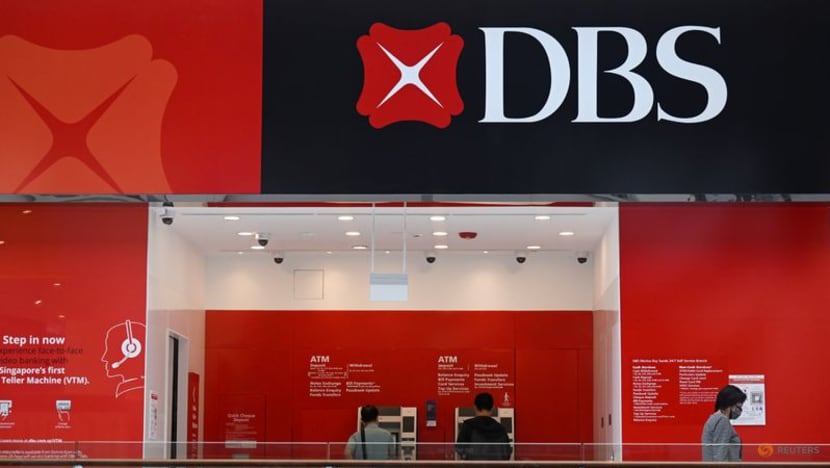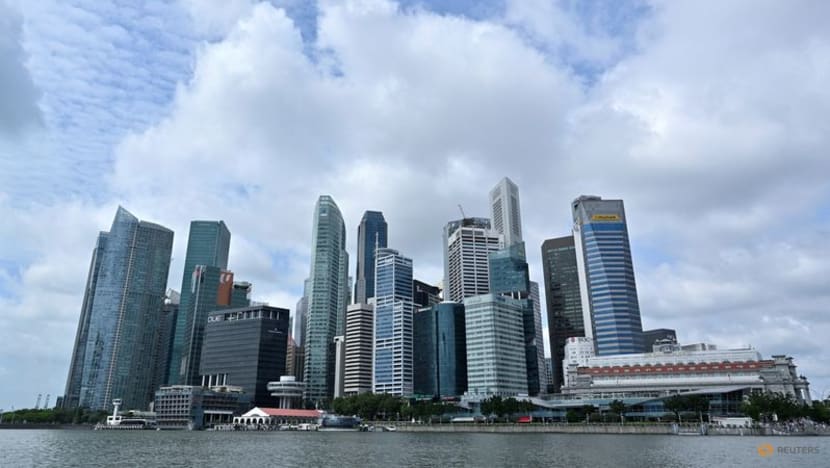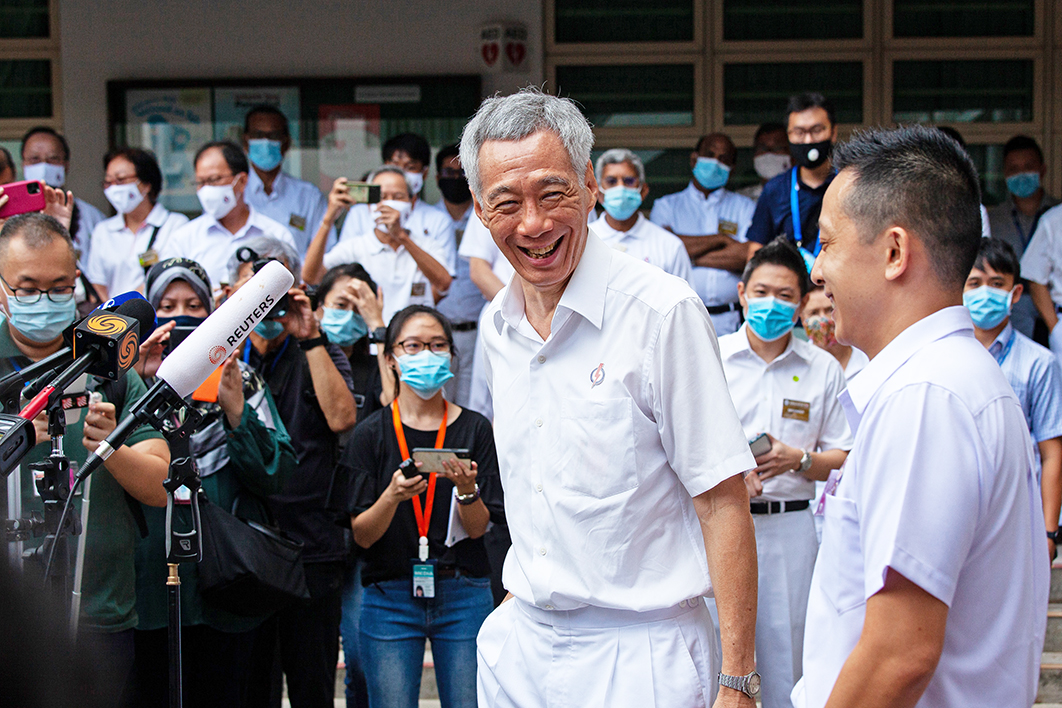Essays & reportage
Singapore swivel
Optus’s troubles shine a light on the company’s ultimate controller, the hydra-headed Singapore Inc.
Eric Ellis
11 October 2022
Right man for the jobs? Singaporean prime minister Lee Hsien Loong in June 2020 at the beginning of yet another successful election campaign for his People’s Action Party.
Ore Huiying/Getty Images
Share
In the pocket of Melbourne’s CBD around RMIT, where a smack in the mouth after a skinful at the Oxford would once have been a more common prospect, you can now buy authentic Xing Fu Tang “boba” bubble tea just like in Taipei. Busy Singapore-style
kopitiams have sprouted up and young mainland Chinese, in a triumph of cash over culture, are running sushi trains. With its influx of foreign students, this one-time urban wasteland — like its counterparts in other Australian cities — projects something of the dynamism of downtown Seoul or Kuala Lumpur.
Few of those foreign students spend more liberally than the 6000-odd Singaporeans who study in Australia each year, arriving from one of Asia’s wealthiest nations. In splashing their cash, they’ve contributed to the $40 billion bounty enjoyed by Australian colleges and universities in return for educating some of Asia’s brightest.
Curiously, these Singaporeans are unlikely to have been such good earners for Optus, the Australian telco they ultimately part-own. Like citizens and taxpayers back home, they help buttress the state-owned corporate colossus known as “Singapore Inc.,” which owns Singtel, Singapore’s dominant telco and Optus’s parent. No, they haven’t suddenly joined Australia’s horror at Optus’s mishandling of its customers’ intimate information: the company appears to have been cancelled by Singaporeans long before embattled chief executive Kelly Bayer Rosmarin became a household name.
These Singaporeans come to Australia knowing their leaders back home in Singapore are champion snoopers and might like to keep an eye on them even when they go abroad. For many Singaporeans, studying in Australia gives access to the intellectual liberties fundamental to our centres of learning: open debate, pluralism, privacy, an untrammelled internet and freedom of speech, some of the stuff Singaporeans don’t get profound experience of back home.
With its Singapore Inc. ownership, though, Optus’s reach creates a Hotel California for some Singaporeans. They might be able to check out of the island state any time they like, but if they choose Optus for their digital needs they may never really leave official Singapore’s reach. There’s never been any evidence of Optus snooping for Singapore, but its critics take no chances, choosing anyone-but-Optus for their SIM cards in case the tentacles of the regime catch them doing, saying, reading or studying something self-preservation dictates they don’t risk back home.
Surveillance has helped keep Singapore’s ruling People’s Action Party in uninterrupted power for sixty-three years, and being monitored is presumed a part of daily life in the highly wired city-state. Singaporeans have normalised this intrusion, assuming their autocratic government tracks their movements, their contacts and calls simply because it can, in a circular system that advances efficiency and suppresses dissent because it sees dissent coming.
This widespread belief gives rise to a curious tic common to many Singaporeans, which I came to call the Singapore Swivel when I was based there as a foreign correspondent through the 2000s. It occurs when small talk advances to an opinion and the interlocutor whispers “off the record” as his or her head pivots left-to-right-to-centre, scanning to see who’s in earshot. Singaporean authorities don’t mind their citizens thinking they are monitoring them, even as they strenuously deny it happens; it’s all part of the machinery. One memorable TV ad promoting Singapore’s navy even showed a submarine crew busily going about tasks onboard before raising the periscope to monitor Singaporeans on land going about theirs.
Control is everything, and Singapore is so skilled at it that snooping has turned into a good little earner for Singapore Inc., generating millions from the sale of surveillance expertise, equipment and systems to despotic regimes like Myanmar’s military junta. But sometimes controllers slip up and get exposed, like when Singtel and Singapore’s home ministry were discovered sifting through the computers of 200,000 SingNet subscribers, their clumsy intrusion detected by a subscriber operating basic anti-hacker software. Investigators of the Optus leak might wish to note Singtel-Optus’s argument with Canberra about how sophisticated — or not — that breach was.
Singapore’s snooping instinct also extends to surveilling its own citizens abroad. One of the world’s leading authorities on Singapore, Australian academic Garry Rodan, knows this concern all too well. “If I was a Singaporean critic of the PAP who was an international student in Australia, and I’ve met quite a few of them over the years, then taking out an Optus account would not have been a natural choice,” he told me last week. “Many students probably headed straight for Telstra or someone else because, even before the advent of sophisticated media and surveillance, these students suspected plants in tutorials reporting to offices and agencies about their criticisms of the Singapore government whilst in Australia. Against this background, signing up with Optus was perceived by some as potentially amplifying the risk of surveillance.”
For years, Singapore’s behaviour in Australia was an open secret that didn’t much stir anyone except its targets. Singaporeans might wonder who ratted on them if they get pulled aside for “random” drug testing upon returning home. But when Singapore’s snooping gets too egregious, Canberra quietly tells it to cut it out. Diplomatically, it does so also knowing that Singapore’s patriarchal philosopher-king Lee Kuan Yew was Australia’s most reliable friend in an often-peevish region dominated by corrupt Suhartos, recalcitrant Mahathirs and their wobbly successors.
Singapore is hardly a democracy (only the ruling parties of China, North Korea and Cuba have been in power longer than the Lees’ People’s Action Party) but it doesn’t kill its own dissidents like China, Burma and Thailand have. A pivotal ASEAN member, it didn’t arc up at Australia’s intervention in East Timor after 1999 either, risking its own interests in a resentful Indonesia. And though a red-for-Chinese dot in a green-for-Islam archipelago, nor did it wobble after 9/11 and Bali in the war on terror.
Yes, the nannyish PAP runs what is effectively a one-party state with a carefully cultivated facade of democracy (traceable ballots anyone?) and a separate legal system, but it has been a benevolent dictatorship in the main, even as its leaders sue domestic critics and opponents into oblivion. And, besides, there’s the food, the hotels and the shopping that makes oh-so-clean Singapore such an easy, cordial place to visit. How can it possibly be sinister?
Singapore Inc. — the expression of Singapore’s state-as-corporation governance model — centres on two state-owned enterprises, Temasek Holdings and the Government Investment Corporation, or GIC. Since 1959, the island has been a Lee family fiefdom, led for decades by Lee Kuan Yew himself and, since 2004, by his eldest son Lee Hsien Loong. During its decades in power, the PAP has largely delivered for Singapore, economically at least. With no natural resources apart from an energetic population and its strategic location where the Indian and Pacific oceans meet, this tiny island is hailed internationally as a swamp-through-semiconductor-to-skyscraper success.
LKY, who died in 2015, was much admired internationally, and his leadership model imitated by authoritarian regimes around the world. It’s evident in Putin’s Russia, Modi’s India, Xi’s China, Duterte’s and now Marcos Jnr’s Philippines, across Africa and among the central Asian ’stans, among the many who’ve beaten a path to Singapore for tips. The Lee model has many Western admirers, too, particularly among chief executives of the Fortune Global 500. Britain’s apprentice prime minister Liz Truss has her own low-tax Singapore-on-Thames aspirations, though they became more like Harare-on-Thames on delivery in late September.
The Singapore model holds that a citizenry is best served by an appointed elite in charge of a smooth-running corporate state, and that sustained economic success can be achieved without meaningful political liberalisation. Democracy doesn’t feature much. If that elite happens to include members of the ruling family then so be it; Singapore Inc.’s boosters insist it’s a meritocracy, and will threaten legal action against anyone who says otherwise.
By that measure, current PM Lee Hsien Loong’s wife Ho Ching — who ran Temasek for almost twenty years and one of its major offshoots, the arms-maker Singapore Technologies, for five years before that — was clearly the best person for both those jobs. Just as Hsien Loong’s brother Hsien Yang was the right man to run Singtel for twelve years — he presided over the Optus deal in 2001 — before he fell out with his PM brother and became a dissident of sorts. And obviously, PM Lee himself is the best person to also chair the GIC, the world’s third-largest sovereign wealth fund with more than $25 billion invested in Australian shares, infrastructure and property alone, just as his father was before him.
Profits are maximised, and dissent minimised, if trusted aides run things without their rule being challenged or even questioned. When Singapore Inc. spinners insist their empire is run according to world’s best practice, Singaporeans are obliged to believe that, and the markets are too. No matter that GIC director and Singapore Inc. lion Koh Boon Hwee once sat on forty-seven boards, including the state governance outfit that made recommendations about how many boards people like him should be allowed to sit on.
Singaporeans get little chance to decide or even debate who will manage their national nest eggs, or how, or call them to account if required. But don’t suggest Singapore Inc. is nepotistic or cronified, or that the country’s politics and business are interconnected or dynastic, lest it draw a libel lawsuit that history suggests, if it’s tried in Singapore, the defendant is sure to lose. A dependable legal system is another cornerstone of Singapore Inc.
When I reported from Singapore, an anonymous samizdat document would often be exchanged among diplomats, correspondents, academics and the tiny band of locals who would bravely question how the national finances were being managed. Entitled “Why It Might Be Difficult for the Government to Withdraw from Business,” it listed the hundreds of senior posts in Singapore Inc. enterprises held by members of the ruling family, by current and former government officials, by members of parliament, and by past and present military commanders. Well-researched and cross-referenced, it became a handbook of Singapore Inc.
That who’s who of the island state’s corporate elite might inform the Australian regulators probing Optus that Singapore Inc.’s clubbishness is evident at Optus’ parent Singtel too, where members can’t help but bump into each other. Singtel’s chairman is local lawyer Lee Theng Kiat, a long-time colleague of Singapore PM Lee Hsien Loong’s wife Ho Ching at another Temasek offshoot, Singapore Technologies. Lee Theng Kiat is also a director at Temasek, which owns Singtel and Optus.
The lead “independent” director on Singtel’s board is Gautam Banerjee, investment giant Blackstone’s chairman in Singapore. Banerjee also sits on Singtel’s risk committee, the one with the Optus headache. Blackstone is 4 per cent owned by Temasek, and the two companies co-own and run a $1 billion investment fund. Like Koh Boon Hwee, who was chairman of Singtel when it did the Optus deal, Banerjee is a director of the GIC sovereign fund that’s chaired by Singapore’s PM Lee, whose wife now chairs the Temasek Trust.
A fellow director of Lee and Banerjee and Koh’s on the GIC’s board is Loh Boon Chye, the chief executive of SGX, Singapore’s stock exchange. Koh is also on the SGX board, and will become chairman in January. SGX’s major shareholder is — you guessed it — Temasek, along with Banerjee’s Blackstone.
Singtel is the SGX’s second-biggest listed company after another Temasek satellite, DBS, one of Asia’s biggest banks, chaired by Peter Seah Lim Huat. Seah is a former chairman of Temasek-controlled Singapore Technologies, which PM Lee’s wife Ho Ching also chaired. And Seah is yet another director of the GIC’s state sovereign fund with Koh, Banerjee and Loh, with PM Lee serving as chair. Conflicts of interest? Nothing to see here.
Singtel’s Optus deal in 2001 attracted much concern. Critics feared an authoritarian foreign regime was buying a strategic Australian communication asset that had defence contracts. Seven Network owner Kerry Stokes said then that if Canberra’s Foreign Investment Review Board allowed the deal, it would demonstrate a “naive approach to national security.” Australia’s communications minister of the day, Richard Alston, was disquieted about the role the Singaporean government might play in managing Optus. Ross Babbage, a former defence secretary and now an international security consultant, articulated the view of many in Australian defence circles concerned about Singapore’s “congenital” inclination to secretly collect and pass on information.
But Coalition treasurer Peter Costello’s FIRB jogged on. Costello had turned down Royal Dutch Shell’s bid for Woodside on national interest grounds months earlier, and some within the Howard government were worried another FIRB refusal might affect Australia’s reputation as being open for foreign investment. It also helped Canberra thinking that Optus’s vendor was already foreign, the British company Cable & Wireless. (Melbourne Liberal Party stalwart Charles Goode, then the chairman of ANZ Bank, was also Woodside chairman at the time and had been on Temasek’s Singapore Airlines board for two years, a power network that suggests it’s not only the Singapore corporate elite that get cosy.)
Singapore got its Australian asset, and two decades later Singtel controls an Asia-Pacific regional communications network that includes an Australian military satellite.
Australian commentators noted in 2001 that this was Singapore Inc.’s first major deal in a robust Western democracy and that Singapore might learn from Australia’s corporate culture, with its mandated transparency reporting procedures, its open media and its shareholder activism. All that might lead tightly wound Singapore into loosening up, they hoped.
On the evidence of its initial instinct to turn inward during the data leak drama, holding back information and trying to shift blame, the opposite appears to have happened. Quickly lawyering up in Singapore, Singtel implored its shareholders to ignore media commentary on the Optus scandal as “speculative,” insisting a class action would be “vigorously defended” even as it was announcing an “independent” review to determine what actually happened.
Also revealingly, Singapore’s state-controlled press has tended to publish straight international wire reports on the scandal instead of reports from its own reporters and commentators — as Singapore’s editors tend to do when they’re unsure about where their government masters will land.
So much of Singapore Inc. is about control. We won’t know for some time how the Optus leak will be resolved, but Singapore’s elite will be discomfited that it has a huge asset it can’t fully control. And that it has shone an unwelcome spotlight on Singapore Inc. that might, just might, throw more light on how it operates. •




















